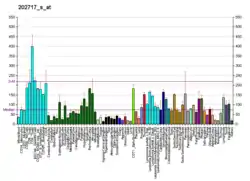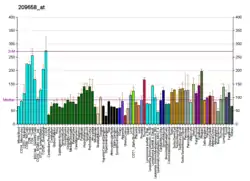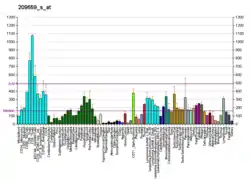CDC16
Cell division cycle protein 16 homolog is a protein that in humans is encoded by the CDC16 gene.[5][6]
Function
This gene encodes a component protein of the APC complex, which is composed of eight proteins and functions as a protein ubiquitin ligase. The APC complex is a cyclin degradation system that governs exit from mitosis. Each component protein of the APC complex is highly conserved among eukaryotic organisms. This protein and two other APC complex proteins, CDC23 and CDC27, contain a tetratricopeptide repeat (TPR), a protein domain that may be involved in protein-protein interaction. Multiple alternatively spliced variants, encoding the same protein, have been identified.[6]
References
- GRCh38: Ensembl release 89: ENSG00000130177 - Ensembl, May 2017
- GRCm38: Ensembl release 89: ENSMUSG00000038416 - Ensembl, May 2017
- "Human PubMed Reference:". National Center for Biotechnology Information, U.S. National Library of Medicine.
- "Mouse PubMed Reference:". National Center for Biotechnology Information, U.S. National Library of Medicine.
- Tugendreich S, Tomkiel J, Earnshaw W, Hieter P (Apr 1995). "CDC27Hs colocalizes with CDC16Hs to the centrosome and mitotic spindle and is essential for the metaphase to anaphase transition". Cell. 81 (2): 261–8. doi:10.1016/0092-8674(95)90336-4. PMID 7736578. S2CID 17907584.
- "Entrez Gene: CDC16 cell division cycle 16 homolog (S. cerevisiae)".
- Vodermaier HC, Gieffers C, Maurer-Stroh S, Eisenhaber F, Peters JM (Sep 2003). "TPR subunits of the anaphase-promoting complex mediate binding to the activator protein CDH1". Current Biology. 13 (17): 1459–68. doi:10.1016/S0960-9822(03)00581-5. PMID 12956947. S2CID 5942532.
- Ollendorff V, Donoghue DJ (Dec 1997). "The serine/threonine phosphatase PP5 interacts with CDC16 and CDC27, two tetratricopeptide repeat-containing subunits of the anaphase-promoting complex". The Journal of Biological Chemistry. 272 (51): 32011–8. doi:10.1074/jbc.272.51.32011. PMID 9405394.
- Kallio M, Weinstein J, Daum JR, Burke DJ, Gorbsky GJ (Jun 1998). "Mammalian p55CDC mediates association of the spindle checkpoint protein Mad2 with the cyclosome/anaphase-promoting complex, and is involved in regulating anaphase onset and late mitotic events". The Journal of Cell Biology. 141 (6): 1393–406. doi:10.1083/jcb.141.6.1393. PMC 2132789. PMID 9628895.
- Gmachl M, Gieffers C, Podtelejnikov AV, Mann M, Peters JM (Aug 2000). "The RING-H2 finger protein APC11 and the E2 enzyme UBC4 are sufficient to ubiquitinate substrates of the anaphase-promoting complex". Proceedings of the National Academy of Sciences of the United States of America. 97 (16): 8973–8. Bibcode:2000PNAS...97.8973G. doi:10.1073/pnas.97.16.8973. PMC 16806. PMID 10922056.
- Kallio MJ, Beardmore VA, Weinstein J, Gorbsky GJ (Sep 2002). "Rapid microtubule-independent dynamics of Cdc20 at kinetochores and centrosomes in mammalian cells". The Journal of Cell Biology. 158 (5): 841–7. doi:10.1083/jcb.200201135. PMC 2173153. PMID 12196507.
- Nilsson J, Yekezare M, Minshull J, Pines J (Dec 2008). "The APC/C maintains the spindle assembly checkpoint by targeting Cdc20 for destruction". Nature Cell Biology. 10 (12): 1411–20. doi:10.1038/ncb1799. PMC 2635557. PMID 18997788.
External links
- Human CDC16 genome location and CDC16 gene details page in the UCSC Genome Browser.
Further reading
- Ollendorff V, Donoghue DJ (Dec 1997). "The serine/threonine phosphatase PP5 interacts with CDC16 and CDC27, two tetratricopeptide repeat-containing subunits of the anaphase-promoting complex". The Journal of Biological Chemistry. 272 (51): 32011–8. doi:10.1074/jbc.272.51.32011. PMID 9405394.
- Yu H, Peters JM, King RW, Page AM, Hieter P, Kirschner MW (Feb 1998). "Identification of a cullin homology region in a subunit of the anaphase-promoting complex". Science. 279 (5354): 1219–22. Bibcode:1998Sci...279.1219Y. doi:10.1126/science.279.5354.1219. PMID 9469815.
- Kallio M, Weinstein J, Daum JR, Burke DJ, Gorbsky GJ (Jun 1998). "Mammalian p55CDC mediates association of the spindle checkpoint protein Mad2 with the cyclosome/anaphase-promoting complex, and is involved in regulating anaphase onset and late mitotic events". The Journal of Cell Biology. 141 (6): 1393–406. doi:10.1083/jcb.141.6.1393. PMC 2132789. PMID 9628895.
- Grossberger R, Gieffers C, Zachariae W, Podtelejnikov AV, Schleiffer A, Nasmyth K, Mann M, Peters JM (May 1999). "Characterization of the DOC1/APC10 subunit of the yeast and the human anaphase-promoting complex". The Journal of Biological Chemistry. 274 (20): 14500–7. doi:10.1074/jbc.274.20.14500. PMID 10318877.
- Chan GK, Jablonski SA, Sudakin V, Hittle JC, Yen TJ (Sep 1999). "Human BUBR1 is a mitotic checkpoint kinase that monitors CENP-E functions at kinetochores and binds the cyclosome/APC". The Journal of Cell Biology. 146 (5): 941–54. doi:10.1083/jcb.146.5.941. PMC 2169490. PMID 10477750.
- Gieffers C, Peters BH, Kramer ER, Dotti CG, Peters JM (Sep 1999). "Expression of the CDH1-associated form of the anaphase-promoting complex in postmitotic neurons". Proceedings of the National Academy of Sciences of the United States of America. 96 (20): 11317–22. Bibcode:1999PNAS...9611317G. doi:10.1073/pnas.96.20.11317. PMC 18031. PMID 10500174.
- Gmachl M, Gieffers C, Podtelejnikov AV, Mann M, Peters JM (Aug 2000). "The RING-H2 finger protein APC11 and the E2 enzyme UBC4 are sufficient to ubiquitinate substrates of the anaphase-promoting complex". Proceedings of the National Academy of Sciences of the United States of America. 97 (16): 8973–8. Bibcode:2000PNAS...97.8973G. doi:10.1073/pnas.97.16.8973. PMC 16806. PMID 10922056.
- Jörgensen PM, Gräslund S, Betz R, Ståhl S, Larsson C, Höög C (Jan 2001). "Characterisation of the human APC1, the largest subunit of the anaphase-promoting complex". Gene. 262 (1–2): 51–9. doi:10.1016/S0378-1119(00)00511-4. PMID 11179667.
- Simpson JC, Wellenreuther R, Poustka A, Pepperkok R, Wiemann S (Sep 2000). "Systematic subcellular localization of novel proteins identified by large-scale cDNA sequencing". EMBO Reports. 1 (3): 287–92. doi:10.1093/embo-reports/kvd058. PMC 1083732. PMID 11256614.
- Stroschein SL, Bonni S, Wrana JL, Luo K (Nov 2001). "Smad3 recruits the anaphase-promoting complex for ubiquitination and degradation of SnoN". Genes & Development. 15 (21): 2822–36. doi:10.1101/gad.912901 (inactive 2021-01-10). PMC 312804. PMID 11691834.CS1 maint: DOI inactive as of January 2021 (link)
- Yasui K, Arii S, Zhao C, Imoto I, Ueda M, Nagai H, Emi M, Inazawa J (Jun 2002). "TFDP1, CUL4A, and CDC16 identified as targets for amplification at 13q34 in hepatocellular carcinomas". Hepatology. 35 (6): 1476–84. doi:10.1053/jhep.2002.33683. PMID 12029633.
- Kallio MJ, Beardmore VA, Weinstein J, Gorbsky GJ (Sep 2002). "Rapid microtubule-independent dynamics of Cdc20 at kinetochores and centrosomes in mammalian cells". The Journal of Cell Biology. 158 (5): 841–7. doi:10.1083/jcb.200201135. PMC 2173153. PMID 12196507.
- Wang Q, Moyret-Lalle C, Couzon F, Surbiguet-Clippe C, Saurin JC, Lorca T, Navarro C, Puisieux A (Mar 2003). "Alterations of anaphase-promoting complex genes in human colon cancer cells". Oncogene. 22 (10): 1486–90. doi:10.1038/sj.onc.1206224. PMID 12629511.
- Vodermaier HC, Gieffers C, Maurer-Stroh S, Eisenhaber F, Peters JM (Sep 2003). "TPR subunits of the anaphase-promoting complex mediate binding to the activator protein CDH1". Current Biology. 13 (17): 1459–68. doi:10.1016/S0960-9822(03)00581-5. PMID 12956947. S2CID 5942532.
- Kraft C, Herzog F, Gieffers C, Mechtler K, Hagting A, Pines J, Peters JM (Dec 2003). "Mitotic regulation of the human anaphase-promoting complex by phosphorylation". The EMBO Journal. 22 (24): 6598–609. doi:10.1093/emboj/cdg627. PMC 291822. PMID 14657031.
- Nousiainen M, Silljé HH, Sauer G, Nigg EA, Körner R (Apr 2006). "Phosphoproteome analysis of the human mitotic spindle". Proceedings of the National Academy of Sciences of the United States of America. 103 (14): 5391–6. Bibcode:2006PNAS..103.5391N. doi:10.1073/pnas.0507066103. PMC 1459365. PMID 16565220.
This article is issued from Wikipedia. The text is licensed under Creative Commons - Attribution - Sharealike. Additional terms may apply for the media files.






